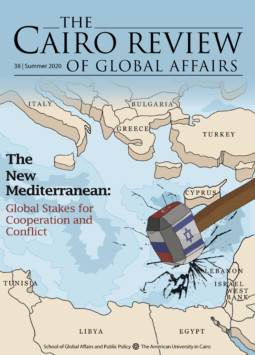Annexation Makes No Policy Sense
The fors and againsts of the West Bank’s annexation.

Cover by Salma Aly.
The fors and againsts of the West Bank’s annexation.
China’s advances in digital-buying make the nation a harbinger of how a post-lockdown global economy could look.
In order to map our future, we may look to the past on how health threats changed societies … or did they?
Lisa Anderson explains how external response to the Libyan conflict largely synchronizes with existing alliances and strategic interests.
Trade liberalization, human capital development, and sectoral reforms can bring Mediterranean countries closer together.
How Russia’s military, diplomatic, and economic roles in the Mediterranean have developed in recent years
The Libyan conflict is marred by competing interests, and is where the Mediterranean’s major players all hope to come out on top.
Can international arbitration and mediation with its neighbors help Greece turn its energy challenges into opportunities in the Eastern Mediterranean?
Europe needs to find ways of reinvigorating its relations with MENA countries to bring stability in its southern neighborhood and Mediterranean region.
Public international law—tied as it is to existent western-centric neo-colonial structures—will likely block the natural gas finds in the Eastern Mediterranean from benefiting regional states.
Will the Eastern Mediterranean natural gas discoveries lead to regional transformation?
Turkey is at one end of competing geostrategic visions in the Eastern Mediterranean, but are there avenues for reconciliation with countries at the opposite pole?
Will Europe’s approach of principled pragmatism toward the Mediterranean succeed in creating stability where previous approaches have failed?
What COVID-19 response can tell us about our readiness to deal with climate change
In the last half-century, Egypt has had to negotiate its way through the Arab–Israeli peace process, regional nuclear proliferation, and domestic political transition. What has it taught us?
Are refugees and asylum seekers protected by its strong domestic laws and international commitments?
Novel ways to understand why the Libyan revolution occurred and moves toward its resolution